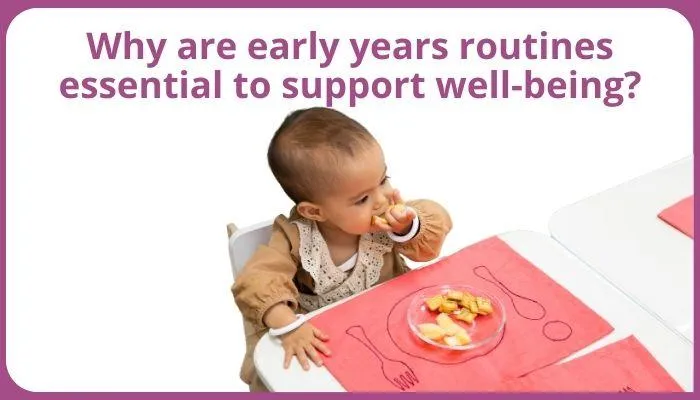Every child's well-being matters.
Well-being Articles

Why are early years routines essential to support the well-being of preschool children?
Custom HTML/CSS/JAVASCRIPTRoutines serve as the foundational structure of a child's day, encompassing regular activities such as meal times, bedtime rituals, and post-school play. Although adherence to routines might seem trivial for adults, it holds significant importance, particularly for preschool-aged children.
Consider waking up each day without a predictable sequence of events. This lack of certainty can be unsettling, especially for preschoolers. Routines offer them a sense of predictability and security, alleviating anxiety and fostering a more relaxed mindset by clearly understanding what to expect next.
One notable aspect of routines is their impact on emotional regulation. Much like adults who feel disoriented without a plan, children benefit from routines' emotional stability. For instance, a consistent nap time after lunch allows them to transition more smoothly into restfulness, reducing the likelihood of becoming irritable.
Routines also play a pivotal role in instilling positive habits. When specific actions, like serving vegetables with meals, are consistently integrated into a routine, children are more likely to uphold these habits as they grow older. Routines empower children by establishing expectations, such as tidying up toys before bedtime and fostering a sense of independence and capability.
Beyond cultivating good habits, routines facilitate learning. Repetition, a key element of routines, provides numerous opportunities for children to practice and acquire new skills. Whether mastering a puzzle or learning about wheels, routines transform the learning process into an enjoyable and accessible experience.
An exceptional aspect of routines is their ability to strengthen relationships. Shared moments during routine activities, be it breakfast together or bedtime stories, create lasting memories and promote connections essential for future resilience and mental health.
Observing a young child adhere to their daily routine highlights its profound significance. Routines offer children security, aid in emotional regulation, instil positive habits, enhance learning, and forge stronger family ties. The impact of a simple routine on a child's well-being is genuinely remarkable.

Why are early years routines essential to support the well-being of preschool children?
Custom HTML/CSS/JAVASCRIPTRoutines serve as the foundational structure of a child's day, encompassing regular activities such as meal times, bedtime rituals, and post-school play. Although adherence to routines might seem trivial for adults, it holds significant importance, particularly for preschool-aged children.
Consider waking up each day without a predictable sequence of events. This lack of certainty can be unsettling, especially for preschoolers. Routines offer them a sense of predictability and security, alleviating anxiety and fostering a more relaxed mindset by clearly understanding what to expect next.
One notable aspect of routines is their impact on emotional regulation. Much like adults who feel disoriented without a plan, children benefit from routines' emotional stability. For instance, a consistent nap time after lunch allows them to transition more smoothly into restfulness, reducing the likelihood of becoming irritable.
Routines also play a pivotal role in instilling positive habits. When specific actions, like serving vegetables with meals, are consistently integrated into a routine, children are more likely to uphold these habits as they grow older. Routines empower children by establishing expectations, such as tidying up toys before bedtime and fostering a sense of independence and capability.
Beyond cultivating good habits, routines facilitate learning. Repetition, a key element of routines, provides numerous opportunities for children to practice and acquire new skills. Whether mastering a puzzle or learning about wheels, routines transform the learning process into an enjoyable and accessible experience.
An exceptional aspect of routines is their ability to strengthen relationships. Shared moments during routine activities, be it breakfast together or bedtime stories, create lasting memories and promote connections essential for future resilience and mental health.
Observing a young child adhere to their daily routine highlights its profound significance. Routines offer children security, aid in emotional regulation, instil positive habits, enhance learning, and forge stronger family ties. The impact of a simple routine on a child's well-being is genuinely remarkable.

Why are early years routines essential to support the well-being of preschool children?
Custom HTML/CSS/JAVASCRIPTRoutines serve as the foundational structure of a child's day, encompassing regular activities such as meal times, bedtime rituals, and post-school play. Although adherence to routines might seem trivial for adults, it holds significant importance, particularly for preschool-aged children.
Consider waking up each day without a predictable sequence of events. This lack of certainty can be unsettling, especially for preschoolers. Routines offer them a sense of predictability and security, alleviating anxiety and fostering a more relaxed mindset by clearly understanding what to expect next.
One notable aspect of routines is their impact on emotional regulation. Much like adults who feel disoriented without a plan, children benefit from routines' emotional stability. For instance, a consistent nap time after lunch allows them to transition more smoothly into restfulness, reducing the likelihood of becoming irritable.
Routines also play a pivotal role in instilling positive habits. When specific actions, like serving vegetables with meals, are consistently integrated into a routine, children are more likely to uphold these habits as they grow older. Routines empower children by establishing expectations, such as tidying up toys before bedtime and fostering a sense of independence and capability.
Beyond cultivating good habits, routines facilitate learning. Repetition, a key element of routines, provides numerous opportunities for children to practice and acquire new skills. Whether mastering a puzzle or learning about wheels, routines transform the learning process into an enjoyable and accessible experience.
An exceptional aspect of routines is their ability to strengthen relationships. Shared moments during routine activities, be it breakfast together or bedtime stories, create lasting memories and promote connections essential for future resilience and mental health.
Observing a young child adhere to their daily routine highlights its profound significance. Routines offer children security, aid in emotional regulation, instil positive habits, enhance learning, and forge stronger family ties. The impact of a simple routine on a child's well-being is genuinely remarkable.

Why are early years routines essential to support the well-being of preschool children?
Custom HTML/CSS/JAVASCRIPTRoutines serve as the foundational structure of a child's day, encompassing regular activities such as meal times, bedtime rituals, and post-school play. Although adherence to routines might seem trivial for adults, it holds significant importance, particularly for preschool-aged children.
Consider waking up each day without a predictable sequence of events. This lack of certainty can be unsettling, especially for preschoolers. Routines offer them a sense of predictability and security, alleviating anxiety and fostering a more relaxed mindset by clearly understanding what to expect next.
One notable aspect of routines is their impact on emotional regulation. Much like adults who feel disoriented without a plan, children benefit from routines' emotional stability. For instance, a consistent nap time after lunch allows them to transition more smoothly into restfulness, reducing the likelihood of becoming irritable.
Routines also play a pivotal role in instilling positive habits. When specific actions, like serving vegetables with meals, are consistently integrated into a routine, children are more likely to uphold these habits as they grow older. Routines empower children by establishing expectations, such as tidying up toys before bedtime and fostering a sense of independence and capability.
Beyond cultivating good habits, routines facilitate learning. Repetition, a key element of routines, provides numerous opportunities for children to practice and acquire new skills. Whether mastering a puzzle or learning about wheels, routines transform the learning process into an enjoyable and accessible experience.
An exceptional aspect of routines is their ability to strengthen relationships. Shared moments during routine activities, be it breakfast together or bedtime stories, create lasting memories and promote connections essential for future resilience and mental health.
Observing a young child adhere to their daily routine highlights its profound significance. Routines offer children security, aid in emotional regulation, instil positive habits, enhance learning, and forge stronger family ties. The impact of a simple routine on a child's well-being is genuinely remarkable.



Facebook
Instagram
LinkedIn
Youtube